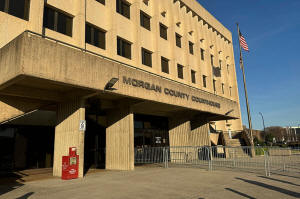Alabama police officer denied immunity for shooting armed Black man in
his front yard
[April 01, 2025]
By SAFIYAH RIDDLE
MONTGOMERY, Ala. (AP) — An Alabama judge ruled on Monday that a police
officer did not prove that he was acting in self-defense when he shot an
armed Black man who was standing in his own front yard, after body
camera footage revealed the officer firing 18 bullets less than two
seconds after identifying himself as law enforcement.
Mac Marquette, 25, is charged with murder in the fatal shooting of Steve
Perkins shortly before 2 a.m. on Sept. 29, 2023, while accompanying a
tow-truck driver to repossess Perkins’ pickup truck at his home in
Decatur.
Morgan County circuit judge Charles Elliott denied Marquette's motion to
dismiss the case in a self-defense immunity hearing. The new trial date
is set for June, but the defense can appeal Elliott's decision with the
state appellate court.
Alabama’s “stand your ground” law grants immunity from prosecution to
any individual who uses deadly force as long as they are in a place they
have a right to be and reasonably believe they are in danger.
Elliott wrote that the jury will have to consider whether Marquette was
“acting in his capacity as a police officer” when he shot Perkins.
“It is on this hinge that the door of this case swings,” he said.
Tow-truck driver Caleb Combs was authorized by Perkins’ creditor to
repossess the truck because Perkins was months behind on his payments,
according to lien documents entered into evidence. But the ruling said
that Marquette wasn’t authorized to assist Combs based on an Alabama law
that requires a court order for law enforcement to be involved in a
repossession, which the officers didn't have.

The judge heard conflicting testimony in an earlier hearing about why
Marquette and the two other officers, Joey Williams and Christopher
Mukadam, were at Perkins' house in the first place.
Marquette, Mukadam and Williams were dispatched to help Combs after
Perkins pointed a gun at his chest when the tow-truck driver first tried
to take Perkins' vehicle, according to testimony from Williams and
Mukadam. Combs met the officers at a nearby tow-yard.
Combs waited for the three officers to set up covertly around Perkins'
house before Combs' returned to repossess Perkins' vehicle for a second
time. All three officers were intentionally hidden from Perkins’ front
door when Combs returned and Perkins’ again emerged from his house with
his gun, pointing it at Combs.
[to top of second column]
|

This photo taken in Decatur, Ala., Tuesday, March 25, 2025, shows
the Alabama courthouse for a case of former Decatur police officer
Mac Marquette's fatally shooting Steve Perkins in 2023. (AP Photo/Safiyah
Riddle)

Body camera footage revealed that Marquette unloaded all the bullets
in his gun less than two seconds after he emerged from where he was
hiding on the side of Perkins' house. Even then, the judge wrote,
Marquette was partially obstructed by the bed of Perkins’ truck.
Perkins turned to face Marquette, and briefly tried to move his gun
away from the officer before Marquette started shooting, according
to Elliott.
Before Combs returned to Perkins’ house, the order said that the
officers should have told Combs “that he could take whoever he
wanted with him to assist with the repossession, but it could not be
law enforcement without judicial process.”
Both officers who were with Marquette testified that they were there
to “keep the peace” and to “investigate” Perkins for pulling a gun
on Combs, which could be a misdemeanor charge of menacing if Combs
had decided to press charges.
The state agent who investigated the case testified that it was
standard practice for officers to accompany people to help maintain
order. But he also said that typically “visibility” is required to
keep the peace, and that the way that the officers set up was
“unusual” for investigating menacing because it is a method
typically “used for an active crime scene."
Because there was no active crime scene when the officers arrived,
Elliott ruled that Marquette was “acting outside of the scope of his
authority” to investigate a menacing allegation “and was therefore a
trespasser” when he waited outside of Perkins house.
Elliott said that the jury will have to decide whether Marquette was
at Perkins' house to keep the peace.
Based on that determination, the ruling read, the jury will have to
decide both whether that means Marquette was acting within the scope
of his responsibilities as a police officer, and whether a
“reasonable” officer would have killed Perkins in the same
situation.
All contents © copyright 2025 Associated Press. All rights reserved
 |